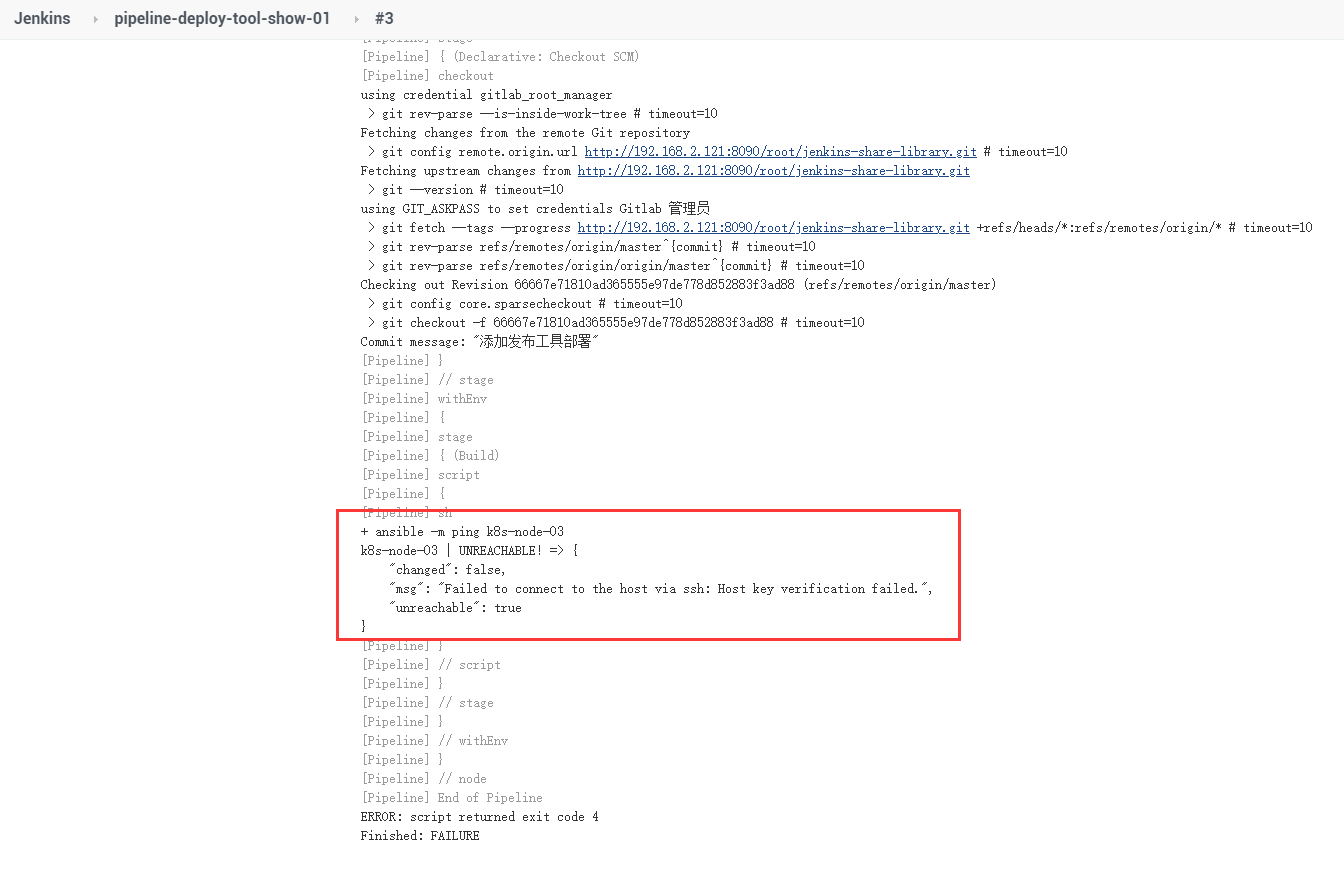1. 什么是 Ansible ?
Ansible 的命名由来?
此名取自 Ansible 作者最喜爱的《安德的游戏》小说,而这部小说更被后人改编成电影 -《战争游戏》。
大家或许早在电影中就已看过安塞波 (Ansible),它是虚构的超光速通讯装置。片中主角安德 (Ender) 和他的伙伴们透过 Ansible 跨越时空指挥无数的战舰,就好比我们操控海量的远端服务器一样。
Ansible介绍
Ansible是个与 Puppet, SaltStack, Chef 并驾齐驱的组态设定 (Infrastructure as Code) 工具,其简单易用的特性让人爱不释手,在 DevOps 界更佔有一席之地。Ansible提供一种最简单的方式用于发布、管理和编排计算机系统的工具,你可在数分钟内搞定。Ansible是一个模型驱动的配置管理器,支持多节点发布、远程任务执行。默认使用 SSH 进行远程连接。无需在被管理节点上安装附加软件,可使用各种编程语言进行扩展。
Ansible特性:
- 拥有模块化的设计,Ansible 能够调用特定的模块来完成特定任务 ,本身是核心组件,短小精悍 ;
- Ansible是基于
Python语言实现的,由Paramiko (python 的一个可并发连接 ssh 主机功能库 ) , PyYAML和Jinja2 ( 模板化 ) 三个关键模块实现; - Ansible的部署比较简单,agentless 无客户端工具;
- 以主从模式工作;
- 支持自定义模块功能;
- 支持playbook剧本,连续任务按先后设置顺序完成;
- 期望每个命令具有
幂等性;
Ansible中文文档地址: http://www.ansible.com.cn/
2. 配置服务器之间免密访问
1. 在Jenkins 服务器中配置ssh-keygen 进行服务器之间免密访问。
bash
$ sudo ssh-keygen
# 一直按 enter 键
----------------------------------- 输入以下内容 -------------------------------------------
Generating public/private rsa key pair.
Enter file in which to save the key (/root/.ssh/id_rsa):
Enter passphrase (empty for no passphrase):
Enter same passphrase again:
Your identification has been saved in /root/.ssh/id_rsa.
Your public key has been saved in /root/.ssh/id_rsa.pub.
The key fingerprint is:
SHA256:hdkdP4b0Elq05+xU7BOVPDjlkCW7NBS5Oa4ywOJhFCY root@kubernetes-node-04
The key's randomart image is:
+---[RSA 2048]----+
| .*=Ooo|
| E o + =.%==.|
| o . o + =+Xo+|
| . . .Xo+.|
| . . S ..=..|
| + o + .|
| o o . . . |
| . o . |
| o |
+----[SHA256]-----+
------------------------------------------------------------------------------------------2. 将自己服务器公钥拷贝到 其他服务器上。
bash
$ ssh-copy-id -p 端口号 root@服务器地址
----------------------------------- 输入以下内容 -------------------------------------------
/usr/bin/ssh-copy-id: INFO: Source of key(s) to be installed: "/root/.ssh/id_rsa.pub"
The authenticity of host '[183.239.218.130]:50010 ([183.239.218.130]:50010)' can't be established.
ECDSA key fingerprint is SHA256:prCykUIV3wFFCEMD5H0m3lpgKT8omsv8e+NLVYxDGQU.
ECDSA key fingerprint is MD5:2f:3c:43:be:6f:cb:3a:73:73:a2:45:0b:77:41:ee:58.
Are you sure you want to continue connecting (yes/no)? yes
/usr/bin/ssh-copy-id: INFO: attempting to log in with the new key(s), to filter out any that are already installed
/usr/bin/ssh-copy-id: INFO: 1 key(s) remain to be installed -- if you are prompted now it is to install the new keys
root@183.239.218.130's password:
Number of key(s) added: 13. 执行访问其他服务器
bash
$ ssh -p 端口号 root@服务器地址3. Ansible 安装与使用
1. 在 Jenkins 服务器上,执行命令安装 Ansible
bash
$ sudo yum install epel-release -y && yum install ansible -y2. 添加免密后服务器的到 Ansible 的清单文件中去。
bash
$ vim /etc/ansible/hosts
----------------------------- 输入免密后服务器地址和定义名称 ----------------------------------
[servers]
nx-smartcity-05 ansible_ssh_host=项目远程服务器ip地址 ansible_ssh_port=50005
nx-smartcity-06 ansible_ssh_host=项目远程服务器ip地址 ansible_ssh_port=50006
nx-smartcity-07 ansible_ssh_host=项目远程服务器ip地址 ansible_ssh_port=50007
nx-smartcity-08 ansible_ssh_host=项目远程服务器ip地址 ansible_ssh_port=50008
nx-smartcity-09 ansible_ssh_host=项目远程服务器ip地址 ansible_ssh_port=50009
nx-smartcity-10 ansible_ssh_host=项目远程服务器ip地址 ansible_ssh_port=50010
nx-smartcity-11 ansible_ssh_host=项目远程服务器ip地址 ansible_ssh_port=50011
nx-smartcity-12 ansible_ssh_host=项目远程服务器ip地址 ansible_ssh_port=50012
k8s-node-01 ansible_ssh_host=192.168.2.110 ansible_ssh_port=22
k8s-node-02 ansible_ssh_host=192.168.2.121 ansible_ssh_port=22
k8s-node-03 ansible_ssh_host=192.168.2.130 ansible_ssh_port=22
-------------------------------------------------------------------------------------------3. 验证是否可以访问成功
bash
$ ansible -m ping servers
--------------------------------- 成功输出,以下信息 -------------------------------------------
nx-smartcity-07 | SUCCESS => {
"ansible_facts": {
"discovered_interpreter_python": "/usr/bin/python"
},
"changed": false,
"ping": "pong"
}
nx-smartcity-08 | SUCCESS => {
"ansible_facts": {
"discovered_interpreter_python": "/usr/bin/python"
},
"changed": false,
"ping": "pong"
}
nx-smartcity-05 | SUCCESS => {
"ansible_facts": {
"discovered_interpreter_python": "/usr/bin/python"
},
"changed": false,
"ping": "pong"
}
nx-smartcity-06 | SUCCESS => {
"ansible_facts": {
"discovered_interpreter_python": "/usr/bin/python"
},
"changed": false,
"ping": "pong"
}
k8s-node-01 | SUCCESS => {
"ansible_facts": {
"discovered_interpreter_python": "/usr/bin/python"
},
"changed": false,
"ping": "pong"
}
nx-smartcity-09 | SUCCESS => {
"ansible_facts": {
"discovered_interpreter_python": "/usr/bin/python"
},
"changed": false,
"ping": "pong"
}
nx-smartcity-11 | SUCCESS => {
"ansible_facts": {
"discovered_interpreter_python": "/usr/bin/python"
},
"changed": false,
"ping": "pong"
}
k8s-node-02 | SUCCESS => {
"ansible_facts": {
"discovered_interpreter_python": "/usr/bin/python"
},
"changed": false,
"ping": "pong"
}
k8s-node-03 | SUCCESS => {
"ansible_facts": {
"discovered_interpreter_python": "/usr/bin/python"
},
"changed": false,
"ping": "pong"
}
nx-smartcity-10 | SUCCESS => {
"ansible_facts": {
"discovered_interpreter_python": "/usr/bin/python"
},
"changed": false,
"ping": "pong"
}
-----------------------------------------------------------------------------------------------4. 编写发布工具流水线
在 GitLab 中 jenkins-share-library 项目目录 创建 Deploy.groovy 文件作为共享的发布工具方法,编写以下代码。
groovy
package org.devops
// ansible
def ansibleDeploy(hosts, func) {
sh " ansible ${func} ${hosts}"
}5. 使用 Jenkins 编写测试流水线
在 GitLab 中 jenkins-share-library 项目创建 deploy.Jenkinsfile 文件进行测试。
代码示例,如下:
groovy
#!groovy
@Library('jenkins-share-library') _
String deployHosts = "${env.deployHosts}"
String deployShell = "${env.deployShell}"
def deploy = new org.devops.Deploy()
pipeline {
agent { node { label "master" } }
stages {
stage("Build") {
steps {
script {
deploy.ansibleDeploy("${deployHosts}","${deployShell}")
}
}
}
}
}6. Ansible 集成 Pipeline 流水线演示效果

7. 扩展-遇到问题与解决
如下图:

bash
# 找的jenkins 系统配置,修改为 root 用户
$ vim /etc/sysconfig/jenkins
---------------------------------- 修改以下信息 -------------------------------------------------
## Type: string
## Default: "jenkins"
## ServiceRestart: jenkins
#
# Unix user account that runs the Jenkins daemon
# Be careful when you change this, as you need to update
# permissions of $JENKINS_HOME and /var/log/jenkins.
# 默认: JENKINS_USER="jenkins"
# 修改后:(由于jenkins 权限不够,修改为root 用户)
JENKINS_USER="root"
-----------------------------------------------------------------------------------------------
# 重启jenkins
$ systemctl restart jenkins
如下图:

